Transferts monétaires et mobilité humaine
Les transferts monétaires sont souvent utilisés lors de crises afin de répondre aux besoins des personnes migrantes. Dans cette page, vous trouverez des ressources sur les transferts monétaires et la migration.

La Croix-Rouge se prépare à fournir une aide humanitaire aux migrant·es de la caravane sur le point de quitter le Honduras pour le Guatemala.
©Johannes Chinchilla / FICR.
Conflits, crises économiques et catastrophes sont autant de raisons ayant contraint des personnes à fuir et à traverser des frontières dans des conditions éprouvantes et risquées, en quête de sécurité et de moyens de subsistance. En 2020, le nombre de personnes déplacées de force s’est envolé au niveau sans précédent de plus de 80 millions de personnes, soit près du double du nombre enregistré il y a une dizaine d’année. Cette tendance s’aggrave et les effets du changement climatique menacent de déplacer jusqu’à 200 millions de personnes d’ici 2050.
L’assistance monétaire est de plus en plus utilisée afin de répondre aux besoins des personnes en situation de déplacement. On y a eu recours à grande échelle dans différents contextes de migration, en Europe en 2015 jusqu’au Venezuela pour « los caminantes ». Elle a également été utilisée dans d’autres crises migratoires, notamment en Amérique centrale, au Sahel, en Méditerranée et dans la Corne de l’Afrique. L’assistance monétaire est à l’heure actuelle l’une des principales formes d’aide apportée aux populations déplacées en Ukraine et dans les pays voisins.
Il existe une myriade de perspectives et de définitions concernant le mot « migrant·e » et la façon dont les humanitaires doivent agir. C’est pourquoi nous ne choisissons pas une définition unique pour le moment, étant donné que les discussions sur l’assistance monétaire et la migration en sont encore à leurs prémices et que le langage évolue encore.
Documenter et partager les données probantes donnera lieu à des interventions plus efficaces. Cette page contient une sélection de ressources utiles concernant la migration et le recours à l’assistance monétaire. Elle sera mise à jour au fil des discussions ayant lieu dans les espaces humanitaires des transferts monétaires.
Priorités actuelles
Afin de contribuer aux progrès relatifs à cet enjeu, nous nous engageons à :
- soutenir la création de données probantes aux niveaux régional et mondial ;
- contribuer aux solutions pratiques visant à mettre en œuvre les transferts monétaires auprès des personnes migrantes ;
- organiser des discussions sur les enjeux majeurs basées sur des données probantes.
Contenu récent

Compte-rendu du CWG régional du 06 novembre 2019
Rapport

Compte-rendu du CWG régional du 11 novembre 2019
Rapport

Panier de dépenses minimum MEB Madagascar
Présentation
Ce document présente les travaux du Travaux du Comité Restreint du Cash Working Group sur le Panier de dépenses minimum MEB Madagascar de novembre 2019.
Objectifs du MEB à Madagascar
■ Comprendre les habitudes de consommation et de dépense des ménages et adapter la réponse aux besoins réels
■...

Nigeria Capacity Gap Analysis
Case Study
Between 2009 and 2019, the Boko Haram insurgency has affected around 13.4 million people in North East of Nigeria. Out the total affected, around 7.1 million are in need of humanitarian assistance while 6.2 million are targeted for humanitarian assistance. To date, 1.8 million people are reported...
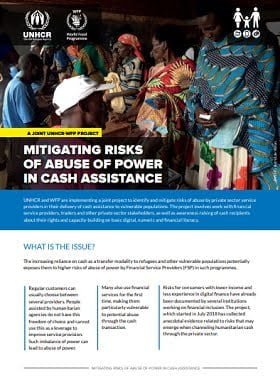
Mitigating Risks of Abuse of Power in Cash Assistance – 4 pages
Report
UNHCR and WFP are implementing a joint project to identify and mitigate risks of abuse by private sector service providers in their delivery of cash assistance to vulnerable populations. The project involves work with financial service providers, traders and other private sector stakeholders, as well as...
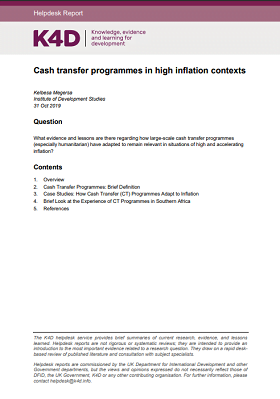
Cash Transfer Programmes in High Inflation Contexts
Report
The use of Cash Transfers (CTs) in developing regions arose as the understanding grew that some other types of aid programmes were not effectively attaining their goals. For instance, emergency food aid was responding to famines, but it was unable to add to food stability. Over time, the persistently poor...

Cash Assistance in Lebanon: Accountability to Affected Populations
Report
The international humanitarian response to the devastating Syrian refugee crisis in Lebanon has grown steadily since 2011 and, today, cash and voucher assistance (CVA) comprises over a third of this assistance. The World Food Programme (WFP) started implementation of its multi-purpose cash (MPC) programme...

MEAL in Emerging Operational Models
Webinar

Multi-Purpose Cash Transfer ‘Plus’: Maximizing impact on children through integrated cash-based programming
Report
In 2018, with the support of OFDA and FFP, Save the Children implemented a multi-purpose cash transfer ‘Plus’ program in response to the influx of Venezuelan into Colombia. The program aimed at covering vulnerable household’s basic needs and prevent them from resorting to negative coping strategies,...

Webinar: Data sharing in CVA: ethics, ownership and privacy
Event

Gender, Cash Assistance, and Conflict: Gendered Protection Implications of Cash and Voucher Assistance in Somalia/Somaliland
Report
The goal of this report is to further understand protection issues in Somalia/land and the implications of CVA on gendered protection issues in the region. This report is structured in reflection of that goal. Following the executive summary, a brief introduction was offered. The section that follows the...

Towards Organizational Readiness for Data Responsibility: A simple framework for responsible data champions
Blog Post
This blog is the third in a series on cash and voucher assistance (CVA) and risk. While the first blog busted some myths around misappropriation and fraud in CVA, the second blog looked into a specific risk for recipients of CVA: the risk of misuse of personal data. This third, guest blog from Linda...

Cash Transfer Programming and Child Protection in Humanitarian Action: Review and opportunities to strengthen the evidence
Report
As prevalence of cash transfer programming in humanitarian response has grown, so too has the recognition that the child protection sector must learn how to use case transfer programs to achieve better results for children. This report summarizes the evidence for cash transfer programming and child...
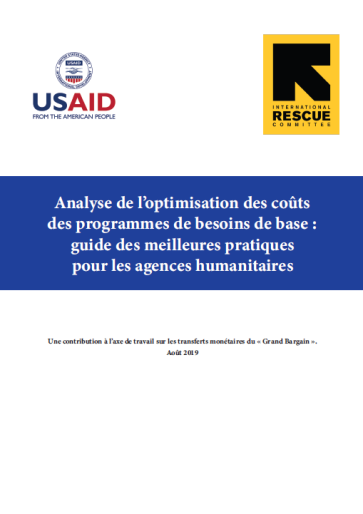
Analyse de l’optimisation des coûts des programmes de besoins de base : guide des meilleures pratiques pour les agences humanitaires
Guides et outils
L’objectif général de cette activité, et de ce document d’orientation en particulier, est « d’améliorer la capacité à réaliser une analyse rigoureuse et cohérente de l’optimisation des coûts dans l’assistance humanitaire ».
Pour ce faire, un document d’orientation technique sera...

Compte-rendu du Cash Working Group de Yaoundé du 02 octobre 2019
Rapport
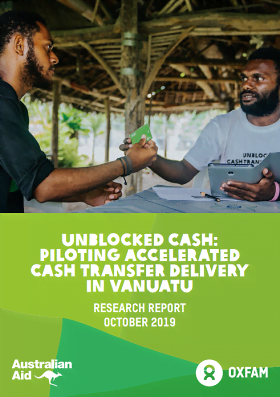
UnBlocked Cash: Piloting Accelerated Cash Transfer Delivery In Vanuatu
Report
Distributed ledger technologies (DLTs) are among the most
promising innovations to have emerged during the last decade,
with the potential to fundamentally transform existing economic,
institutional and social systems. Often referred to as ‘Blockchains’
in honour of the first example developed by...
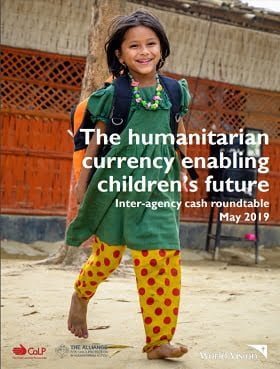
The humanitarian currency enabling children’s future – Inter-agency cash roundtable
Report
This summary report highlights key presentation insights, and recommendations from the CALP Network & World Vision co-hosted inter-agency Cash Roundtable, focusing on how CVA can be an enabler to promote child protection and child wellbeing, based on most recent research, case studies from across the...

Compte-rendu du 27 septembre 2019-Burkina CWG
Rapport
Compte-rendu du 27 septembre 2019

Entretiens avec Kassim Malle, UNHCR et Lionel Ouedraogo, co-lead du CWG Burkina
Blog Post
Dans cette interview, nous faisons un point sur les transferts monétaires au Burkina. La situation humanitaire préoccupante a entrainé un grand nombre de déplacés internes, mettant ainsi en évidence les gaps en matière de coordination. Nous entretenons avec Kassim Malle, du CBT officer pour le HCR...

An ABC for MPC: What multipurpose cash can and cannot do
Blog Post
Terminology Matters From cash coordination workshops in Dakar to market-based programming sessions in Geneva, anyone who has ever discussed cash and voucher assistance (CVA) in a meeting can tell you that terminology is a challenge – especially when it comes to multipurpose cash. However, speaking the...